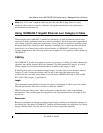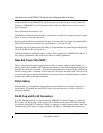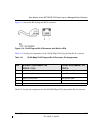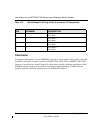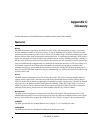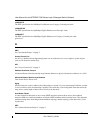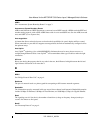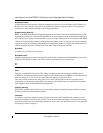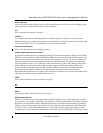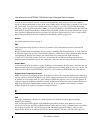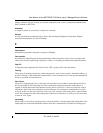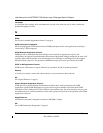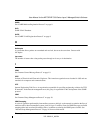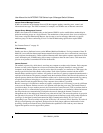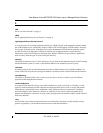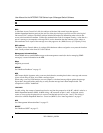
User Manual for the NETGEAR 7300 Series Layer 3 Managed Switch Software
Glossary C-5
202-10009-01_060204
Class of Service
A term to describe treating different types of traffic with different levels of service priority. Higher priority
traffic gets faster treatment during times of switch congestion
CLI
See “Command Line Interface” on page 5.
Collision
A term used to describe two colliding packets in an Ethernet network. Collisions are a part of normal
Ethernet operation, but a sudden prolonged increase in the number of collisions can indicate a problem with
a device, particularly if it is not accompanied by a general increase in traffic.
Command Line Interface
CLI is a line-item interface for configuring systems.
Common Open Policy Service Protocol
A proposed standard protocol for exchanging network policy information between a Policy Decision Point
(PDP) in a network and Policy Enforcement Points (PEPs) as part of overall Quality of Service (QoS) - the
allocation of network traffic resources according to desired priorities of service. The policy decision point
might be a network server controlled directly by the network administrator who enters policy statements
about which kinds of traffic (voice, bulk data, video, teleconferencing, and so forth) should get the highest
priority. The policy enforcement points might be router or layer 3 switches that implement the policy
choices as traffic moves through the network. Currently, COPS is designed for use with the Resource
Reservation Protocol (RSVP), which lets you allocate traffic priorities in advance for temporary
high-bandwidth requirements (for example, video broadcasts or multicasts). It is possible that COPS will be
extended to be a general policy communications protocol.
COPS
See “Common Open Policy Service Protocol” on page 5.
D
DHCP
See “Dynamic Host Configuration Protocol” on page 6.
Differentiated Services
Diffserv is a protocol for specifying and controlling network traffic by class so that certain types of traffic
get precedence - for example, voice traffic, which requires a relatively uninterrupted flow of data, might get
precedence over other kinds of traffic. Differentiated Services is the most advanced method for managing
traffic in terms of what is called Class of Service (CoS). Unlike the earlier mechanisms of 802.1P tagging
and Type of Service (ToS), Differentiated Services avoids simple priority tagging and depends on more
complex policy or rule statements to determine how to forward a given network packet. An analogy is made



